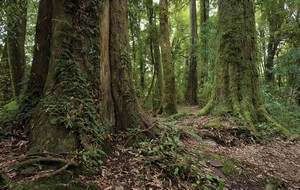Working in partnership with Maori

Scion continues to build and develop robust partnerships with Māori stakeholders whose interests are growing across the forestry value chain.
Maori own some 40 per cent of the land on which commercial forests are planted and want to participate more actively with forest growing and wood processing in order to achieve greater economic returns and social benefits.
Māori are keen to explore forestry options for under-developed land including new forestry opportunities based on indigenous species, either through new forest plantings of, for example tōtara or kauri, or through the sustainable management of existing indigenous forests on their land.
The emerging bioeconomy provides new prospects for Māori to utilise their renewable energy resources; realising the synergies between Māori owned forests, food and tourism businesses (food packaging); and the opportunity to play a direct role in the development and manufacture of industrial bioproducts.
Highlights from our partnerships with Māori in 2015-16 included:
- Working closely with Tangata Whenua Roopu Te Tai Tokerau to develop solutions for kauri dieback disease.
- Continuing to build our partnerships in Northland, providing new forestry investment opportunities through tōtara, mānuka and alternative exotics such as Douglas-fir and eucalypts.
- Supporting capability building with a Māori forestry operation to facilitate a GIS specialist from Ngāti Tuwharetoa to design and undertake precision forestry research to assist commercial decision making.
- The development of a commercial partnership with Ngāti Whare focussed on the vegetative propagation of podocarps for indigenous forest restoration.
- A significant multi-year research programme with Ngāti Porou to develop adaptive governance tools to improve land resilience for at-risk Māori land within the Waiapu Catchment. We are also working with East Coast iwi to develop assessment tools to identify land suitable to grow mānuka for honey and oil.
The Scion Māori Partnership Plan 2016-17 provides the framework for our work with Māori for the year ahead, and pathway to achieving three overarching strategic goals:
- To increase land utilisation and productivity.
- To derive benefit from diversification and indigenous species.
- To grow Māori participation in the bioeconomy.
Our partnerships with Māori are built on trust, understanding, regular communication and the delivery of services that solve problems and discover valuable new opportunities.
